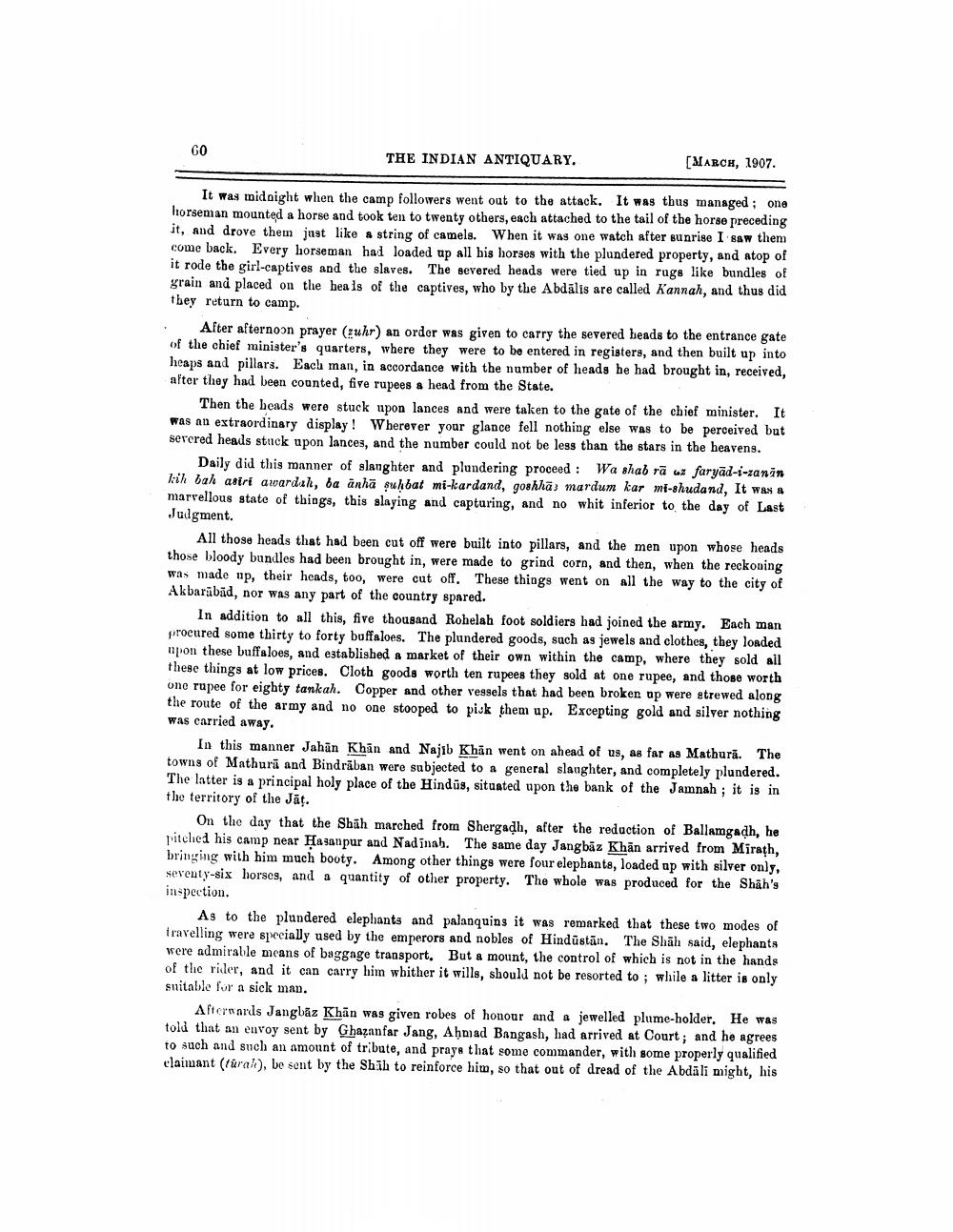________________
60
THE INDIAN ANTIQUARY.
[MARCH, 1907.
It was midnight when the camp followers went out to the attack. It was thus managed; one horseman mounted a horse and took ten to twenty others, each attached to the tail of the horse preceding it, and drove them just like a string of camels. When it was one watch after sunrise I saw them come back. Every horseman had loaded up all his horses with the plundered property, and atop of it rode the girl-captives and the slaves. The severed heads were tied up in rugs like bundles of grain and placed on the heals of the captives, who by the Abdalis are called Kannah, and thus did they return to camp.
After afternoon prayer (zuhr) an order was given to carry the severed heads to the entrance gate of the chief minister's quarters, where they were to be entered in registers, and then built up into heaps and pillars. Each man, in accordance with the number of heads he had brought in, received, after they had been counted, five rupees a head from the State.
Then the heads were stuck upon lances and were taken to the gate of the chief minister. It was an extraordinary display! Wherever your glance fell nothing else was to be perceived but severed heads stuck upon lances, and the number could not be less than the stars in the heavens.
Daily did this manner of slaughter and plundering proceed: Wa shab rā uz faryad-i-zanān kih bah asiri awardah, ba änha suhbat mi-kardand, goshhas mardum kar mi-shudand, It was a marvellous state of things, this slaying and capturing, and no whit inferior to the day of Last Judgment.
All those heads that had been cut off were built into pillars, and the men upon whose heads those bloody bundles had been brought in, were made to grind corn, and then, when the reckoning was made up, their heads, too, were cut off. These things went on all the way to the city of Akbarābād, nor was any part of the country spared.
In addition to all this, five thousand Rohelah foot soldiers had joined the army. Each man procured some thirty to forty buffaloes. The plundered goods, such as jewels and clothes, they loaded upon these buffaloes, and established a market of their own within the camp, where they sold all these things at low prices. Cloth goods worth ten rupees they sold at one rupee, and those worth one rupee for eighty tankah. Copper and other vessels that had been broken up were strewed along the route of the army and no one stooped to pick them up. Excepting gold and silver nothing was carried away.
In this manner Jahan Khan and Najib Khan went on ahead of us, as far as Mathura. The towns of Mathura and Bindraban were subjected to a general slaughter, and completely plundered. The latter is a principal holy place of the Hindus, situated upon the bank of the Jamnah; it is in the territory of the Jät.
On the day that the Shah marched from Shergadh, after the reduction of Ballamgadh, he pitched his camp near Hasanpur and Nadinah. The same day Jangbaz Khan arrived from Mirath, bringing with him much booty. Among other things were four elephants, loaded up with silver only, seventy-six horses, and a quantity of other property. The whole was produced for the Shah's inspection.
As to the plundered elephants and palanquins it was remarked that these two modes of travelling were specially used by the emperors and nobles of Hindustan. The Shah said, elephants were admirable means of baggage transport. But a mount, the control of which is not in the hands of the rider, and it can carry him whither it wills, should not be resorted to; while a litter is only suitable for a sick man.
Afterwards Jangbaz Khan was given robes of honour and a jewelled plume-holder. He was told that an envoy sent by Ghazanfar Jang, Aḥmad Bangash, had arrived at Court; and he agrees to such and such an amount of tribute, and prays that some commander, with some properly qualified claimant (tural), be sent by the Shah to reinforce him, so that out of dread of the Abdali might, his




